|
|
|
Sort Order |
|
|
|
Items / Page
|
|
|
|
|
|
|
| Srl | Item |
| 1 |
ID:
058835
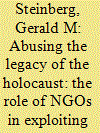

|
|
|
| 2 |
ID:
190047
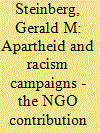

|
|
|
|
|
| Summary/Abstract |
Under the headings of promoting human rights and international law, the influential network of non-governmental organisations (NGOs) has been a central actor in the political war targeting Israel though allegations of apartheid and racism. In applying these slanders, the NGOs systematically erase the history of the Arab-Israeli conflict, including decades of warfare and terrorism, and join in the attempt to delegitimize the nation-state of the Jewish people, regardless of borders, and as distinct from criticism of Israeli policies regarding territory occupied in the 1967 war. This process constitutes the essence of post-Holocaust or ‘new antisemitism’, as included in the consensus working definition published by the International Holocaust Remembrance Alliance. The NGO campaigns are constructed on the foundations established by the Soviet and Islamic blocs culminating in the 1975 UN ‘Zionism is racism’ resolution. This theme was revived in the NGO Forum of the 2001 Durban Conference, led by Human Rights Watch, Amnesty International, and Palestinian groups such as Al-Haq, and used to justify appropriating the methods of the South African anti-apartheid campaign, including boycotts and lawfare. After the Durban conference and for 20 years since, this NGO network continued and expanded the campaign based on the apartheid and racism allegations. Their claims were amplified in media platforms, international bodies, anti-Israel church groups and on university campuses in the form of ‘Israel apartheid weeks’. European governments enabled activities of the Palestinian and Israeli NGOs through substantial funding, estimated at 120 million Euros annually. In 2020 and 2021, the NGO emphasis on these themes increased, led by HRW, and supporting the decision of the ICC prosecutor to accept jurisdiction over Palestinian claims and to open investigations against Israel. This context amplified the potency of the allegations of apartheid and racism in attempts to demonise Israel.
|
|
|
|
|
|
|
|
|
|
|
|
|
|
|
|
| 3 |
ID:
049648
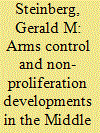

|
|
|
|
|
| Publication |
Israel, BESA Centre for Strategic Studies, 2000.
|
| Description |
71p.
|
| Series |
Security and policy studies: no.44
|
|
|
|
|
|
|
|
|
|
|
|
Copies: C:1/I:0,R:0,Q:0
Circulation
| Accession# | Call# | Current Location | Status | Policy | Location |
| 043927 | 327.1740956/STE 043927 | Main | On Shelf | General | |
|
|
|
|
| 4 |
ID:
160938
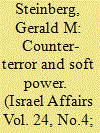

|
|
|
|
|
| Summary/Abstract |
For many years, the network of non-governmental organizations (NGOs) claiming a human rights agenda has consistently sought to delegitimise Israel’s counterterrorism strategy. This phenomenon was prominent during the 2008–2009 and 2014 Gaza wars, when these groups issued hundreds of statements condemning Israel, and in campaigns calling for UN commissions of inquiry (e.g. the Goldstone and Schabas/Davis investigations) into Israeli ‘war crimes’. NGO allegations were also the foundations of lawfare, including efforts to prosecute Israeli officials in the International Criminal Court and other venues, and for BDS campaigns against Israeli and Jewish targets. In this soft-power strategy, the perception of NGO officials as ‘security experts’ provides a major source of legitimacy, lending credence to their reports, despite the lack of credible fact-finding methodologies. Similarly, NGO legal analyses, based on problematic and aspirational interpretations, are accepted and echoed widely, without independent verification. In response, the IDF and Ministry of Defence first ignored and then sought to engage the NGOs in order to persuade them to accept Israeli perceptions and counterterror policies. When these responses failed, the emphasis shifted to countering NGO credibility in legal and diplomatic venues, which has also had limited impact to date.
|
|
|
|
|
|
|
|
|
|
|
|
|
|
|
|
| 5 |
ID:
091348
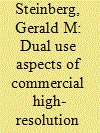

|
|
|
|
|
| Publication |
Israel, BESA, 2002.
|
| Description |
57p.
|
| Series |
BESA security policy studies No.37
|
|
|
|
|
|
|
|
|
|
|
|
Copies: C:1/I:0,R:0,Q:0
Circulation
| Accession# | Call# | Current Location | Status | Policy | Location |
| 045556 | 384.5456/STE 045556 | Main | On Shelf | General | |
|
|
|
|
| 6 |
ID:
074602
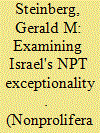

|
|
|
| 7 |
ID:
122066
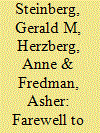

|
|
|
|
|
| Publication |
2012.
|
| Summary/Abstract |
International human rights NGOs utilize soft power resources to shape discourse on state compliance with the Laws of Armed Conflict (LOAC), as well as related policy decisions. The NGO impact is generally due to perceived expertise, credibility and commitment to universal principles. This article examines these factors in the NGO campaign in the UK calling for an arms embargo against Israel. NGO reports and activities created the basis for the July 2009 decision by the British government to cancel five military export licences. However, as shown, these reports contain problematic methodologies, inaccurate claims, and controversial interpretations of international law.
|
|
|
|
|
|
|
|
|
|
|
|
|
|
|
|
| 8 |
ID:
113989
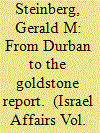

|
|
|
|
|
| Publication |
2012.
|
| Summary/Abstract |
Disproportionate and unsubstantiated allegations of human rights violations, war crimes and racism have been employed as a form of political warfare designed to isolate Israel internationally. This strategy, based on the model used to defeat the apartheid government in South Africa, was adopted in 2001 at the NGO Forum of the UN-sponsored Durban Conference on racism, in which 1500 organizations participated. Since then, as demonstrated in this article, many human rights NGOs have consistently supported the political agenda of the Organization of the Islamic Conference (OIC), whose members dominate the UN Human Rights Council. In the decade following the Durban conference, the NGO network has issued frequent condemnations of Israel based on false or unverifiable allegations of human rights abuses and 'war crimes'. The NGO campaigns, led by international groups such as Human Rights Watch and Amnesty International, are central in this process, from Jenin (2002), through the UNHRC's Goldstone Report on the Gaza war (2009). Journalists, academics, diplomats, political leaders, and legal officials in liberal Western democracies frequently cite these generally unsubstantiated allegations in condemning Israeli policies, reflecting the 'soft power' of these NGOs acting to reinforce the Palestinian narrative and the objectives of the OIC.
|
|
|
|
|
|
|
|
|
|
|
|
|
|
|
|
| 9 |
ID:
177568
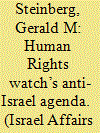

|
|
|
|
|
| Summary/Abstract |
The influence of Human Rights Watch (HRW) is reflected in the organisation’s intense involvement in institutions that emphasise human rights, including the United Nations and the International Criminal Court. However, HRW and its leaders have been strongly criticised for intense political and ideological bias against Israel and for proliferating unsubstantiated accusations to fit this bias. This article documents the role of Kenneth Roth, Executive Director since 1993, in this politicisation. Roth’s direct involvement with Israel-focused activities is fundamentally different from his role on other topics and countries on HRW’s agenda, and contrasts strongly with norms of universality and political neutrality.
|
|
|
|
|
|
|
|
|
|
|
|
|
|
|
|
| 10 |
ID:
105427
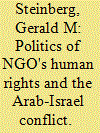

|
|
|
|
|
| Publication |
2011.
|
| Summary/Abstract |
Terms such as "non-governmental organization" or "global civil society" are used to describe tens of thousands of groups, varying greatly in structure, objective, funding, impact, and other key aspects. The main influence of these organizations results from the application of "soft power" as "the ability to get what you want through attraction rather than coercion or payments". NGOs are particularly influential on issues related to human rights and humanitarian aid. Their soft-power is based on the perception of technical expertise, combined with morality and normative goals, untainted by partisan politics or economic objectives, and projected through the media and other channels. Powerful NGOs, such as Human Rights Watch, Amnesty International, and the International Federation of Human Rights, work cooperatively in transnational advocacy networks, using the language and frameworks of human rights and humanitarian assistance, These organizations spread their views and campaigns via frameworks such as the UN Human Rights Council, in alliance with diplomats and political leaders from selected governments with similar objectives. Israeli policy has been a central focus of this NGO soft-power influence from the 2001 Durban NGO Forum through the UN Goldstone Commission on the Gaza war. The central role of NGO influence is reflected in the Goldstone Commission's mandate, procedures, and reports, and the campaign to implement its recommendations. The article examines the influence of NGO activity in the political conflict, and on Israeli foreign and security policy in particular.
|
|
|
|
|
|
|
|
|
|
|
|
|
|
|
|
| 11 |
ID:
061800
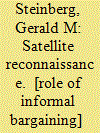

|
|
|
|
|
| Publication |
New York, Praeger, 1983.
|
| Description |
viii, 200p.
|
| Standard Number |
0030631866
|
|
|
|
|
|
|
|
|
|
|
|
Copies: C:1/I:0,R:0,Q:0
Circulation
| Accession# | Call# | Current Location | Status | Policy | Location |
| 024369 | 358.80973/STE 024369 | Main | On Shelf | General | |
|
|
|
|
| 12 |
ID:
075813
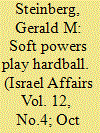

|
|
|
|
|
|
|
|